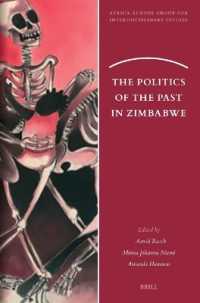- ホーム
- > 洋書
- > 英文書
- > Business / Economics
Full Description
Grantwriters often have little or no training in the practical task of grantseeking. Many feel intimidated by the act of writing, and some don't enjoy writing. In Storytelling for Grantseekers, Second Edition, Cheryl Clarke presents an organic approach to grantseeking, one that views the process through the lens of the pleasures and rewards of crafting a good story. Grantseekers who approach the process as one in which they are connecting with an audience (grantmakers) and writing a narrative (complete with settings, characters, antagonists and resolutions) find greater success with funders. The writing process becomes a rewarding way to tell the organization's tale, rather than a chore, and their passion and creativity lead to winning proposals. This book walks readers through all the main phases of the proposal, highlighting the creative elements that link components to each other and unify the entire proposal. The book contains resources on crafting an effective synopsis, overcoming grantwriter's block, packaging the story, and the best ways to approach the "short stories" (inquiry and cover letters) that support the larger proposal.
Clarke also stresses the need to see proposal-writing as part of a larger grantseeking effort, one that emphasizes preparation, working with the entire development staff, and maintaining good relations with funders. In Storytelling for Grantseekers, new and experienced grantseekers alike will discover how to write and support successful proposals with humor and passion.
New edition features:
Overall updates as well as both refreshed and new examples
Workshop exercises for using the storytelling approach
New chapters on the application of the storytelling method to other fundraising communications like appeal letters and case statements, as well as the importance of site visits
Example of a full narrative proposal
Contents
Examples ix
Foreword xi
Preface xv
Acknowledgments xix
The Author xxi
Introduction: Why Storytelling? 1
One: First Steps: Getting Ready for Grantseeking 5
Two: Research and Relationships: Finding and Cultivating Your Audience 17
Three: The Short Story: Writing Letters of Inquiry 37
Four: The Proposal Narrative: Introducing the Characters and the Place 47
Five: The Need or Problem: Building Tension and Conflict into Your Story 65
Six: Goals, Objectives, and Methods: Making Changes by Addressing the Problem 87
Seven: Evaluation and Future Funding: Writing the Epilogue and Planning for a Sequel 101
Eight: The Budget: Translating Your Story from Words to Numbers 113
Nine: The Summary, Titles, and Headings: Preparing Your Marketing Copy 131
Ten: Packaging: Publishing Your Proposal Story 141
Eleven: Site Visits and Beyond: Interacting with Funders 159
Twelve: Beyond Grants: Applying the Storytelling Method 169
Afterword 177
Appendix: The Final Manuscript: Two Letter Proposal Samples 179
Index 185







